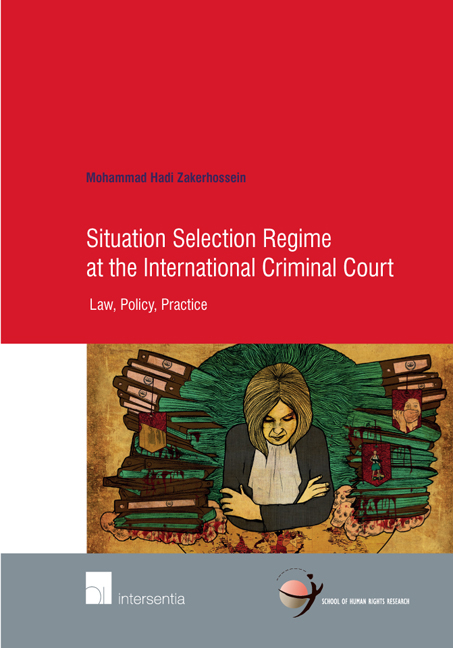Book contents
- Frontmatter
- Contents
- Acknowledgment
- Abbreviations
- General Introduction
- Part One Formulating the Concept of Situation in the Rome Statute Sense
- Part two Situation Selection Process
- Part three Situation Selection Criteria
- Part Four Situation Selection In Light Of Expressivism
- Conclusion
- Bibliography
- ICC Case Tables
- OTP Documents
- About the Author
- School of Human Rights Research Series
Conclusion
Published online by Cambridge University Press: 13 October 2018
- Frontmatter
- Contents
- Acknowledgment
- Abbreviations
- General Introduction
- Part One Formulating the Concept of Situation in the Rome Statute Sense
- Part two Situation Selection Process
- Part three Situation Selection Criteria
- Part Four Situation Selection In Light Of Expressivism
- Conclusion
- Bibliography
- ICC Case Tables
- OTP Documents
- About the Author
- School of Human Rights Research Series
Summary
This book ‘Situation Selection at the International Criminal Court (Law, Policy, Practice)’ aimed to clarify and rationalize the process in which a situation is selected at the ICC, and to explain the criteria that are applied in selecting a situation. The ICC law, the prosecutorial policies and the practice of the Court in this regard were studied in detail. In addition, a normative and evaluative framework was established, namely the expressivism theory, through which the ICC law, policies and practices as to the situation selection regime were justified and evaluated.
This ending section of this study summarizes the main results from this research and identifies some significant recommendations for the Court.
‘SITUATION’ AS A CONCEPT WITH AN AMBIGUOUS DEFINITION
The ‘situation’ notion should be defined precisely, and the identification stage should be recognized and designed within the ICC's architecture. The borders of the preliminary examination and its objects should be defined precisely in order to enhance the quality of its functioning.
Part One of this research was tasked to address a conceptual question: what does a situation mean in the Rome Statute? Situation is a unique notion at the ICC legal system. This is the point of departure for the Court's functioning. The Court activates its jurisdiction over a situation. The situational phase precedes the case stage at the ICC. In spite of its importance, the situation notion has not been defined by the Rome Statute. A situation in the sense of the Rome Statute consists of two elements, namely the contextual element and jurisdictional parameters. The contextual component is the factual aspect of a situation that refers to a concrete crisis. Although the contextual element of a situation is not a legal concept, the contextual elements of the ICCidentified crimes are of assistance in determining a situational context. An internal or international armed conflict, or a campaign of systematic or widespread attacks against civilian populations may constitute a crisis that is the central component of the situation notion. A crisis may stem from various reasons, such as electoral competitions, war on natural resources or ideological and political tensions. A crisis is a critical distinguishing factor that contributes to separating a situation from other situations.
- Type
- Chapter
- Information
- Situation Selection Regime at the International Criminal CourtLaw, Policy, Practice, pp. 401 - 412Publisher: IntersentiaPrint publication year: 2017

